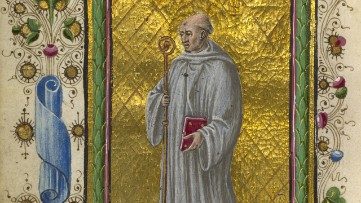St. Bernard, Abbott and Doctor of the Church

A family gathered together in prayer
Bernard was born in 1090 at Fontaine, in France, of a good family. When he was 22, after having studied grammar and rhetoric, he entered the monastery founded by Robert of Molesme at Citeaux (in Latin, Cistercium -- the order centred around the monastery were thus known as Cistercians). Twelve companions joined him, including four brothers, an uncle, and a cousin. Following his example, many of his relatives undertook to enter religious life.
Jesus and Mary
For Bernard, the monastic life should involve work, contemplation, and prayer; and revolve around two fixed points: Jesus and Mary. For the Cistercian abbot, Christ is all: “When you discuss or speak, nothing has any flavour for me, if I have not heard you resound the Name of Jesus (Sermons on the Song of Songs, XV). And Mary, St Bernard writes, leads us to Jesus: “In dangers, In dangers, in doubts, in difficulties, think of Mary, call upon Mary. Let not her name depart from your lips, never suffer it to leave your heart. And that you may more surely obtain the assistance of her prayer, neglect not to walk in her footsteps. With her for guide, you shall never go astray…” (Homily II on the text Missus est).
The four grades of love
In his work On Loving God, Bernard points out the path of humility in order to achieve love of God. He exhorts us to love God without measure. For the Cistercian monk, there are four fundamental degrees or grades of love:
· Love of oneself for oneself: “First, one loves oneself for one’s own sake. Seeing, then, that by himself he cannot subsist, he begins to seek God by means of faith.”
· Love of God for love of self: “In the second grade, then, one loves God, but for oneself, not for Him. Beginning then to attend to God and to honour Him, in relation to one’s own needs.”
· Love of God for God: “The soul passes to the third grade, loving God not for oneself, but for Him. In this degree we stop for a long time; indeed, I do not know if in this life it is possible to reach the fourth grade.”
· Love of self for God: “That degree, that is, in which one loves himself only for love of God. Then, there will be a wonderful almost forgetfulness of self, almost abandoning of oneself so that everything tends toward God, so much so as to be one spirit only with Him.”
Bernard and the Templars
Among the writings of St Bernard is also the celebrated elegy of the monastic military order of the Templars, founded in 1119 by a group of knights under the guidance of Hugues de Payens, from Champagne, a relative of Bernard. In his work In Praise of the New Knighthood, he described the Templars in these words: “They are vested simply and covered with dust, their faces burned by the sun, their gaze proud and hard; before the battle they are armed interiorly with the strength of faith. Their only faith is addressed to God.”
The mellifluous doctor
Bernard of Clairvaux died on 20 August 1153; he was proclaimed a saint by Pope Alexander III in 1174. Pope Pius XII dedicated an encyclical to him, entitled Doctor mellifluus, in which he recalled, in particular, these words of St Bernard: “Jesus is honey on the lips, melody in the ear, joy in the heart.” “The mellifluous doctor,” the Pope wrote, “‘The ‘Doctor Mellifluus,’ ‘the last of the Fathers, but certainly not inferior to the earlier ones,’ was remarkable for such qualities of nature and of mind, to which God added an abundance of heavenly gifts.”







